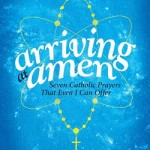In 2015, I’m reading and blogging through Ronald Knox’s collection of sermons on Christian exemplars, Captive Flames: On Selected Saints and Christian Heroes. Every Monday (kinda), I’ll be writing about the next portrait in the book, so you’re welcome to peruse them all and/or read along.

In this week’s chapter of Captive Flames, Roland Knox discusses the stories of King David and St Edmund of Abingdon in parallel, as a lens on how Catholics should live as exiles in the world and how they should root themselves. It’s certainly a topic I’m interested in! But I disagreed strongly with Knox’s characterization of the spirit in which this Benedict Option-like life should be lived. Knox wrote:
It is possible nowadays, thank God, for laymen to take a direct and public part in spreading the faith. But, even apart from that, we Catholics do not live as our grandfathers used to live, in a sort of water-tight compartment, separated from the world around us. We mix freely with Protestant neighbours, and either we shall influence them or they us. If we are not strongly fortified in the practice of religion, their unbelief will tell upon our faith, their low standard of morality will infect and degrade our consciences.
Maybe this is part of the problem of generalizing from saints to regular folks. It’s ridiculous for me to assume that other people will degrade my conscience rather than me degrading theirs, simply because I’m a member of the church I think it most likely to be true. That’s a claim about the superiority of the Church, not about me.
I frequently receive productive correction or moral examples from non-Catholics simply because you don’t have to be right about everything to notice when someone else is being wrong about some particular thing. Our blind spots with regard to our own behavior are large enough that pretty much everyone who reads through the Evil Overlord List and reads this piece of advice (“One of my advisors will be an average five-year-old child. Any flaws in my plan that he is able to spot will be corrected before implementation.”) winds up chuckling ruefully, thinking of past errors.
There’s reason to welcome the moral claims other make about me — I don’t accept them uncritically, but I try to at least get curious. I find it often helps to treat moral correction and questions the way Orson Scott Card suggests a writer should handle beta reader feedback in his How to Write Science Fiction and Fantasy. I don’t have the quote at hand, but he says that readers are pretty much always right when they say part of a story doesn’t work for them, and rarely right when they tell the author how to fix it. (I think I’ve seen other authors give this advice, too).
Everyone has a conscience, naturally (though imperfectly) directing our attention to the good, so when my actions make someone else pause, confused or hurt, that’s pretty valuable data. Sometimes I’m still right, and this is a moral error that the other person is making, sometimes we have different beliefs about the physical world but we’d agree ethically if we resolved them and we should both try to figure out what’s going on, sometimes I’m doing the right thing, but I’m not conveying some important piece of context and, absent that, other people are right to oppose me, and sometimes I’m just plain wrong!
In last week’s chapter, Knox implied that just-plain-heretics can still be good beta readers of a Catholic’s choices, since sometimes sects try to strike out on their own because they think the Catholic church isn’t living up to Catholic ideals. That’s the right-about-the-problem, wrong-about-the-solution kind of help that beta readers tend to provide.
So, ultimately, I found Knox’s chapter frustrating this week because I think there’s plenty of room to warn Catholics not to “lose their saltiness” without implying that the people they move among are necessarily corrupting. I’d expect folks who took this passage too much to heart to be too defensive against external threats and not-vigilant-enough against internal ones (at the scale of an individual church or conscience).
















